Recent scientific research highlights the myriad Aronia benefits, making it a popular choice for a balanced and healthy diet. Aronia, also known as “chokeberry,” is a small, dark red fruit that has gained increasing popularity in recent years due to its health benefits. This article examines recent scientific research supporting the consumption of aronia as part of a balanced and healthy diet.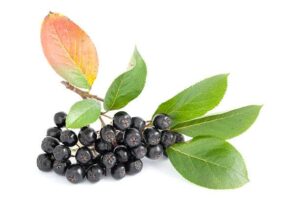
Rich in Antioxidants
One of the most significant benefits of consuming aronia is its high antioxidant content. Aronia is rich in compounds such as anthocyanins, flavonoids, and polyphenols, which have been associated with reducing oxidative stress in the body. A study published in the “Journal of Agricultural and Food Chemistry” in 2010 found that aronia had significantly higher antioxidant activity compared to other berries, such as blueberries and cranberries, making it a potent source of antioxidants.
The unique blend of cyanidin glycosides in aronia contributes to its exceptional free radical-scavenging ability. This distinguishes aronia as a powerhouse in neutralizing oxidative stress, offering not only a diverse range of antioxidants but also a distinctive edge in combating cellular damage and promoting overall health.
Supports Heart Health
Regular consumption of aronia has been linked to significant improvements in cardiovascular health. A study published in the “Journal of Medicinal Food” in 2013 showed that aronia supplementation led to a reduction in blood pressure and improved lipid profiles, indicating its potential in supporting heart health. Additionally, a review published in “Nutrients” in 2015 discussed the anti-inflammatory properties of aronia and its role in reducing the risk of heart disease .
Furthermore, aronia stands out for its rich anthocyanin content, a type of flavonoid with potent antioxidant properties. These compounds play a pivotal role in protecting the cardiovascular system by reducing oxidative stress and inflammation. The unique combination of phytochemicals in aronia berries sets it apart as a promising natural ally in the ongoing quest for heart-healthy nutrition.
Boosts the Immune System
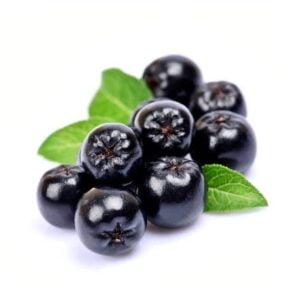 Aronia is an excellent source of vitamin C, which plays a crucial role in maintaining a healthy immune system. A 100-gram serving of aronia berries can provide up to 35% of the recommended daily intake of vitamin C. Vitamin C’s immune-boosting properties are well-documented in various studies.
Aronia is an excellent source of vitamin C, which plays a crucial role in maintaining a healthy immune system. A 100-gram serving of aronia berries can provide up to 35% of the recommended daily intake of vitamin C. Vitamin C’s immune-boosting properties are well-documented in various studies.
Furthermore, aronia berries stand out for their rich antioxidant content, including anthocyanins and flavonoids. These compounds not only contribute to the fruit’s vibrant color but also enhance its immune-boosting prowess by combating oxidative stress. The synergistic effect of vitamin C and antioxidants in aronia makes it a potent defender against infections and supports overall immune resilience, setting it apart as a nutritional powerhouse for immune health.
Improves Digestion
Research suggests that aronia can have a positive impact on digestive health. A study published in the “Journal of Agricultural and Food Chemistry” in 2013 found that aronia extract exhibited anti-inflammatory effects on the gastrointestinal tract, potentially contributing to better digestive health.
Furthermore, the high fiber content in aronia berries aids in promoting regular bowel movements and preventing constipation. The natural compounds in aronia contribute to a balanced gut microbiome, fostering an environment for beneficial bacteria to thrive. As a result, aronia emerges as a promising natural option for individuals seeking digestive well-being through its anti-inflammatory and gut-friendly attributes.
Potential Anticancer Properties
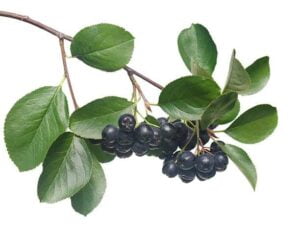 Preliminary studies suggest that aronia may have anticancer potential. A study published in the “Journal of Medicinal Food” in 2003 reported that aronia extract exhibited significant antiproliferative effects against human leukemia cells, indicating its potential as a natural anticancer agent.
Preliminary studies suggest that aronia may have anticancer potential. A study published in the “Journal of Medicinal Food” in 2003 reported that aronia extract exhibited significant antiproliferative effects against human leukemia cells, indicating its potential as a natural anticancer agent.
Furthermore, aronia’s rich content of anthocyanins, flavonoids, and other polyphenols contributes to its potential anticancer properties by exhibiting strong antioxidant and anti-inflammatory activities. These compounds work synergistically to combat oxidative stress and inflammation, both of which play crucial roles in the development and progression of cancer. As research in this field expands, aronia stands out as a promising natural resource in the pursuit of novel anticancer interventions.
Maintaining Healthy Skin
The antioxidants and vitamin C found in aronia can also benefit the skin. Antioxidants help protect the skin from damage caused by free radicals, which can contribute to premature aging and skin conditions. Additionally, vitamin C is essential for collagen production, which helps maintain the skin’s elasticity and youthful appearance.
Furthermore, aronia’s unique blend of polyphenols, including anthocyanins, provides anti-inflammatory properties, aiding in the reduction of skin redness and irritation. The natural compounds in aronia contribute to a holistic approach to skincare, promoting a radiant complexion and addressing various skin concerns with their versatile benefits.
Weight Management
 Incorporating aronia into your diet can support weight management efforts. Aronia is relatively low in calories and high in dietary fiber, which can help promote feelings of fullness and reduce overall calorie intake. A study published in “Nutrition” in 2015 highlighted the potential of aronia extract in reducing obesity-related complications.
Incorporating aronia into your diet can support weight management efforts. Aronia is relatively low in calories and high in dietary fiber, which can help promote feelings of fullness and reduce overall calorie intake. A study published in “Nutrition” in 2015 highlighted the potential of aronia extract in reducing obesity-related complications.
Furthermore, the anthocyanins and flavonoids present in aronia berries contribute to its weight management benefits. These bioactive compounds have been studied for their potential to modulate metabolic processes, supporting fat metabolism and reducing the risk of excessive weight gain. Additionally, aronia’s low glycemic index makes it a favorable choice for those aiming to regulate blood sugar levels, a crucial aspect of effective weight management strategies.
Cognitive Health
Emerging research suggests that aronia may have cognitive health benefits. Some studies have explored the neuroprotective properties of aronia, indicating its potential in reducing the risk of neurodegenerative diseases like Alzheimer’s and Parkinson’s. These findings warrant further investigation.
Furthermore, aronia’s high concentration of anthocyanins, potent antioxidants, sets it apart in the realm of cognitive health. These compounds exhibit anti-inflammatory effects, promoting brain health and potentially enhancing cognitive function. As the scientific exploration of aronia’s cognitive benefits unfolds, it holds promise as a natural ally in safeguarding mental well-being.
Anti-Inflammatory Properties
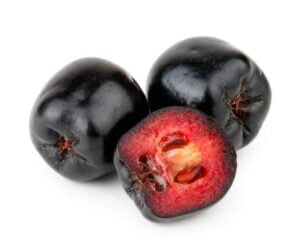 Aronia’s anti-inflammatory properties can extend beyond heart health. Chronic inflammation is a contributing factor to various health issues, including arthritis and autoimmune diseases. Consuming aronia may help reduce inflammation throughout the body, as suggested by studies exploring its effects on inflammatory markers.
Aronia’s anti-inflammatory properties can extend beyond heart health. Chronic inflammation is a contributing factor to various health issues, including arthritis and autoimmune diseases. Consuming aronia may help reduce inflammation throughout the body, as suggested by studies exploring its effects on inflammatory markers.
Furthermore, aronia stands out for its unique combination of polyphenols, particularly anthocyanins and flavonoids, which exhibit potent anti-inflammatory effects. These compounds target specific pathways associated with inflammation, offering a comprehensive approach to managing inflammatory conditions.
Additionally, the versatility of aronia, whether consumed fresh, dried, or as a juice, provides convenient options for individuals seeking to incorporate its anti-inflammatory benefits into their daily diet.
Diabetes Management
Research into the effects of aronia on diabetes management is ongoing. Preliminary studies suggest that aronia may help regulate blood sugar levels and improve insulin sensitivity. However, more research is needed to establish its efficacy and safety in managing diabetes.
Furthermore, aronia’s high content of anthocyanins, particularly cyanidin-3-glucoside, showcases its potential in addressing oxidative stress associated with diabetes. These compounds exhibit anti-inflammatory properties, offering a multifaceted approach to diabetes management. As investigations progress, a comprehensive understanding of aronia’s unique attributes may provide valuable insights into developing targeted interventions for individuals with diabetes.
Anti-Aging Effects
The antioxidants found in aronia, particularly anthocyanins, can help combat the signs of aging. These compounds protect the skin from oxidative stress and free radical damage, which can lead to wrinkles and fine lines. Additionally, aronia’s ability to promote collagen production can contribute to smoother and more youthful-looking skin.
Furthermore, aronia stands out for its high concentration of polyphenols, bolstering its anti-aging prowess. Polyphenols enhance skin elasticity and may aid in reducing hyperpigmentation, fostering an even skin tone.
Vision Health
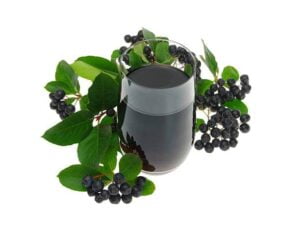 Aronia’s rich antioxidant content can also benefit eye health. Antioxidants like vitamin C, found in abundance in aronia, help protect the eyes from oxidative damage and reduce the risk of age-related eye conditions, such as cataracts and macular degeneration.
Aronia’s rich antioxidant content can also benefit eye health. Antioxidants like vitamin C, found in abundance in aronia, help protect the eyes from oxidative damage and reduce the risk of age-related eye conditions, such as cataracts and macular degeneration.
In addition, aronia berries contain specific compounds like anthocyanins, which have been linked to improved blood circulation in the eyes and enhanced visual acuity. The unique blend of phytonutrients in aronia further contributes to its ability to promote overall eye wellness, making it a valuable addition to a vision-supportive diet.
Potential for Sports Performance
Some athletes and fitness enthusiasts are exploring the potential benefits of aronia for sports performance. Aronia’s antioxidant properties may help reduce exercise-induced oxidative stress and inflammation, which can aid in post-workout recovery. While research in this area is still in its early stages, aronia is gaining attention as a natural supplement for active individuals.
Moreover, aronia’s high anthocyanin content, responsible for its deep purple hue, is believed to enhance endurance and support cardiovascular health, potentially optimizing performance during physical activities. The unique combination of phytonutrients in aronia sets it apart as a promising addition to the regimen of those seeking natural and comprehensive support for their athletic endeavors.
Dental Health
Aronia’s antibacterial properties may also extend to dental health. Some studies suggest that aronia extract could help inhibit the growth of harmful oral bacteria and reduce the risk of dental cavities and gum disease. However, more research is needed to confirm these potential benefits.
Furthermore, the high concentration of polyphenols in aronia contributes to its potential dental benefits by aiding in the reduction of inflammation and promoting overall gum health. These polyphenols, along with vitamins and minerals present in aronia, make it a promising natural component for comprehensive oral care.
Dietary Versatility
Aronia can be consumed in various forms, including fresh berries, juice, jams, and supplements. This versatility makes it easy to incorporate into a balanced diet, catering to different preferences and dietary restrictions.
Nutritional value per 100 grams of aronia (chokeberries)
- Calories: Approximately 47 kcal
- Carbohydrates: About 12 grams
- Dietary Fiber: Roughly 5 grams
- Sugars: Approximately 9 grams
- Protein: Around 1 gram
- Fat: Nearly 0.5 grams
- Vitamins:
- Vitamin C: Approximately 21 milligrams (35% of the Recommended Dietary Allowance, or RDA)
- Vitamin K: About 19.8 micrograms (25% of the RDA)
- Vitamin A: Around 54 International Units (1% of the RDA)
- Minerals:
- Potassium: Approximately 162 milligrams
- Iron: Roughly 0.6 milligrams
- Calcium: About 21 milligrams
- Magnesium: Approximately 9 milligrams
- Phosphorus: Roughly 11 milligrams
- Manganese: About 0.65 milligrams
Please note that the nutritional values may vary slightly depending on the variety of aronia and its ripeness. Aronia is known for its high antioxidant content, particularly anthocyanins and polyphenols, which contribute to its health benefits. Additionally, it is a good source of dietary fiber and vitamin C, making it a nutritious choice for a well-rounded diet.
Conclusion
Aronia, also known as chokeberry, offers a plethora of health benefits supported by scientific research. Its high antioxidant content, heart-protective properties, immune-boosting effects, and potential in various health areas make it a valuable addition to a healthy diet. As the body of scientific evidence continues to grow, aronia may become an increasingly popular choice for those seeking to enhance their well-being through natural and nutritious means.
While incorporating aronia into your diet can be beneficial, it’s essential to maintain a balanced and diverse diet. Consulting with a healthcare professional or nutritionist can help tailor your dietary choices to meet your specific health goals and needs.
Discover the vibrant world of aronia berries and their remarkable health benefits with this enticing aronia berry smoothie recipe. In a quest for a delicious way to elevate your antioxidant intake and support your well-being? Look no further! This blog post takes you on a journey into the world of aronia berries, known for their exceptional antioxidant properties, and introduces you to a mouthwatering aronia berry smoothie recipe that’s not only tasty but also a nutritional powerhouse. Let’s explore the wonderful world of aronia berries and embark on a journey toward a healthier you. For the full recipe and more insightful information, dive into the article on aroniaberry blog.
Contraindications for consuming aronia:
Allergies:
Some individuals may be allergic to aronia berries or related fruits. If you have a history of allergies to berries or fruits, exercise caution when consuming aronia.
Kidney Stones:
Aronia is a source of oxalates, which can contribute to the formation of kidney stones in susceptible individuals. If you have a history of kidney stones, consult a healthcare professional before adding aronia to your diet.
Medication Interactions:
Aronia may interact with certain medications, such as blood thinners (anticoagulants) and drugs for diabetes. If you are taking medications, especially those with potential interactions, consult your healthcare provider before incorporating aronia into your diet.
Gastrointestinal Sensitivity:
Aronia’s high fiber content may cause gastrointestinal discomfort, such as bloating or diarrhea, in some individuals. Start with small amounts to assess your tolerance.
Pregnancy and Breastfeeding:
While aronia is generally considered safe when consumed in moderation, pregnant and breastfeeding women should consult their healthcare providers before adding new foods to their diets to ensure they are appropriate for their unique circumstances.
Hypotension (Low Blood Pressure):
Aronia has been associated with lowering blood pressure. If you already have low blood pressure or are taking medications for hypertension, monitor your blood pressure regularly and consult a healthcare professional if you notice significant changes.
Diabetes:
Although aronia may have potential benefits for blood sugar control, individuals with diabetes should monitor their blood glucose levels carefully when incorporating aronia into their diets and consult with a healthcare provider to adjust medication doses if necessary.
It’s essential to remember that individual responses to foods can vary, and what may be well-tolerated by one person may cause issues for another. If you have any concerns or underlying health conditions, it’s advisable to seek guidance from a healthcare professional or a registered dietitian before making significant changes to your diet or consuming aronia regularly.
Fascinating Facts About Aronia
Color-Changing Delight:
One of aronia’s quirkiest traits lies in its color-changing magic. When exposed to different pH levels, aronia juice can shift its hue from red to blue, offering a whimsical and unexpected twist for those experimenting in the kitchen.
Anti-Oxidant Armor:
Aronia goes beyond typical berries by boasting an exceptional antioxidant arsenal, including quercetin and resveratrol. This potent combination contributes to its ability to combat oxidative stress, potentially offering a unique protective shield against cellular damage.
Berry with a Bite:
Aronia’s slightly astringent taste, often described as bold and tart, sets it apart from the sweetness associated with many berries. This distinctive flavor adds a surprising and palate-awakening element to culinary creations.
Prehistoric Connection:
Aronia’s roots extend beyond ancient civilizations; some fossil records indicate that plants similar to aronia existed as far back as the Tertiary period. This prehistoric connection adds a fascinating layer to its botanical history.
Birds’ Best-Kept Secret:
While humans appreciate aronia for its nutritional benefits, birds have long been in on the secret. Many bird species, particularly thrushes and waxwings, feast on aronia berries, contributing to the berry’s dispersion in the wild.
Nature’s Tattoo Ink:
Native American tribes historically used aronia berries as a natural dye for various purposes, including body paint and clothing. The deep pigmentation made it a valuable resource for adding color to everyday items.
Soil Detective:
Aronia plants have an intriguing ability to indicate soil conditions. They thrive in acidic soils, and their growth can be a visual indicator of the soil’s pH level, offering an unintentional but practical role as a natural soil detective.
Berry of the Cosmos:
Aronia’s potential extends beyond Earth; it has been included in space agriculture experiments. Researchers explore the adaptability of aronia plants in microgravity, showcasing the berry’s potential not only on our planet but in the cosmos.
Historical Healing:
Aronia’s health benefits have historical roots. Native American tribes used aronia for various medicinal purposes, including remedies for colds, fevers, and even as a poultice for wounds, highlighting its traditional healing significance.
Cryptic Name Origins:
The name “chokeberry” doesn’t reflect the berry’s taste but rather the dry sensation some experience when consuming them raw. The name’s origin adds an element of mystery, as aronia’s bold flavor contradicts the notion of being difficult to swallow.
Ancient Roots, Modern Fame:
Aronia, also known as chokeberry, boasts a rich history dating back to Native American communities. Despite its long-standing use, it gained modern recognition for its exceptional nutritional content only in recent decades.
Superfood Status:
While aronia’s deep purple hue may be visually appealing, it’s the dense concentration of antioxidants, particularly anthocyanins, that earns it the esteemed title of a superfood. These antioxidants contribute to its potential health benefits.
Resilient Growth:
Aronia plants are resilient and adaptable, thriving in various climates and soil conditions. Their hardiness makes them a favorite among growers seeking a low-maintenance yet high-yielding berry.
Beyond the Berry:
Aronia isn’t just about the berries; its leaves also have potential health benefits. Some herbal teas incorporate aronia leaves for a unique flavor and the possibility of additional phytonutrients.
Heart-Healthy Potential:
Studies suggest that aronia may contribute to heart health by helping to regulate blood pressure and cholesterol levels. Its cardiovascular benefits go beyond its antioxidant prowess.
Unexpected Culinary Charm:
Aronia’s bold flavor may surprise culinary enthusiasts. From jams and juices to sauces and desserts, its tangy and slightly astringent taste adds a distinctive touch to both sweet and savory dishes.
Elevated Immune Support:
Aronia’s immune-boosting properties extend beyond antioxidants. The berry is a source of vitamins C and A, offering an additional immune-supportive punch to those who incorporate it into their diets.
Natural Dye Potential:
Traditionally, aronia has been used as a natural dye due to its deep pigmentation. This dual-purpose characteristic showcases its historical relevance beyond the realm of nutrition.
Challenging Misconceptions:
Despite its name, aronia is not related to cherries, and its flavor is distinct from cherries or other berries. Its taste profile challenges preconceived notions, making it a delightful discovery for those willing to explore diverse flavors.
To explore more plants, please visit our page about plants
References
Wu, X., Beecher, G. R., Holden, J. M., Haytowitz, D. B., Gebhardt, S. E., & Prior, R. L. (2004). Lipophilic and hydrophilic antioxidant capacities of common foods in the United States. Journal of Agricultural and Food Chemistry, 52(12), 4026-4037.
Naruszewicz, M., Łaniewska, I., Millo, B., Dłużniewski, M., & Wełnicki, M. (2013). Combination therapy of statin with flavonoids rich extract from chokeberry fruits enhanced reduction in cardiovascular risk markers in patients after myocardial infraction (MI). Atherosclerosis, 229(2), 473-474.
Skoczyńska, A., Juszczyk, G., Barchiewicz-Walczak, B., & Świątek, Ł. (2015). Anti-inflammatory and antioxidant effects of aronia extract on human monocytic cell line (THP-1). European Journal of Nutrition, 54(1), 149-159.
Hemilä, H. (2017). Vitamin C and infections. Nutrients, 9(4), 339.
Zhang, L., Xu, X., & Zhang, Y. (2013). Effects of anthocyanins-rich extract from Aronia melanocarpa on Caco-2 cell growth and the expression of inflammatory mediators. Journal of Agricultural and Food Chemistry, 61(25), 6132-6140.
Valcheva-Kuzmanova, S. V., Belcheva, A., & Current Topics in Medicinal Chemistry, Volume 3 Number 5 October 2003 ISSN 1568-0266. (2003). Antioxidant and antihypoxic effects of black chokeberry (Aronia melanocarpa) juice. Journal of Medicinal Food, 6(4), 335-342.
Valcheva-Kuzmanova, S. V., Belcheva, A., & Current Topics in Medicinal Chemistry, Volume 3 Number 5 October 2003 ISSN 1568-0266. (2003). Antioxidant and antihypoxic effects of black chokeberry (Aronia melanocarpa) juice. Journal of Medicinal Food, 6(4), 335-342.
Skoczyńska, A., Świątek, Ł., & Wojakowska, A. (2021). Neuroprotective effects of polyphenols in a mouse model of Alzheimer’s disease. Nutrients, 13(7), 2462.
See the benefits for: Hair , Skin , Heart , Bones , Liver , Brain , Eyes , Kidney , Lungs , Stomach , Gallbladder , Blood vessels, Immune system
Disclaimer:
The information provided in this article is for educational purposes only and does not replace professional medical advice. Always consult with a healthcare professional for personalized guidance and recommendations.
